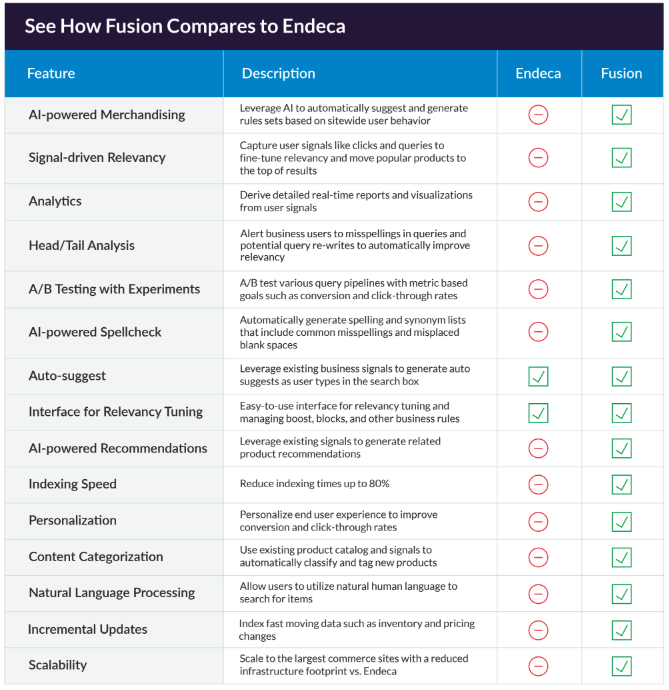10 Reasons to Replace Endeca to Deliver an Enhanced Ecommerce Search Experience
Endeca hasn't been supported in years, so here's ten reasons to ditch the platform and switch to Lucidworks Fusion today.

When you deployed Endeca, it was the best ecommerce search platform on the market. With state of the art relevance, faceted search, and customer experience tools it drove search for most of the large ecommerce sites. But that was then. With years since a major refresh, Endeca fails to meet customer expectations today.
Now that Endeca is in its End of Life (EOL), it’s time for your organization to evaluate possible Endeca replacement options to get the most value out of search. From dozens of Endeca replacement projects, we’ve put together a checklist of considerations. Here are 10 reasons to replace Endeca, and why you should consider Lucidworks Fusion for Ecommerce.
1. Converts More Browsers Into Buyers With AI-Powered Personalization
AI-powered technologies are giving businesses competitive edges today. Unfortunately, Endeca was built without the ability to leverage AI. In the age of Amazon and Google, customers don’t expect to learn how to use your site; they expect it to learn how to best serve them. Leverage customer Signals and AI-powered search to determine intent and recommend products and content that meet your customers wants while driving acquisition and conversion in return.
91% of consumers say they are likely to shop with brands that provide offers and recommendations that are relevant to them and 90% from a brand that provides personalized experiences.
The top five benefits of personalization include increased visitor engagement (55%), improved customer experience (55%), improved brand perception (39%), increased conversion rates (51%) and increased lead generation and customer acquisition (46%)
“We’ve seen dramatic bumps in conversion rates and, overall, some of those key success metrics for transactional revenue within an order of magnitude of a 50% increase since the migration.”
– Marc Desormeau, Senior Manager, Digital Customer Experience, Lenovo
2. Get More out of Search with NLP & Conversational Search
More than ever, customers today expect search to understand them in their natural language vs having to use simple keywords. The broad adoption of voice based assistants, chatbots, and voice search has significantly contributed to these expectations. ML based query rewriting, synonym learning, and vector search all help support this automatically at scale virtually eliminating the need for any manual synonyms, redirects, stop words, required in platforms like Endeca. Paired with other Fusion capabilities incorporating knowledge graphs, and signals takes this a step further by supporting adaptation and personalization of these results based on context and behavior for example.
3. Better Understand Customer Intent With Head-n-Tail Analysis
Customers don’t always describe things in the same terms that your site does. An Artificial Intelligence technique called “Head-n-Tail Analysis” automatically fixes search keywords based on misspellings, word order, synonyms and other types of common mismatches. Lack of this capability in Endeca puts an enormous burden on search teams.

4. Improve Query Understanding with Domain Specific Knowledge Graphs
Domain specific knowledge graphs go beyond the dictionary capabilities in Endeca and query intent by managing the connections between entities and concepts. This vastly improves performance of query intent inference. This is the same technology in use by Google and Amazon. They dramatically help improve your existing data and taxonomy through data science and machine learning. Knowledge graphs improve search results and SEO by aligning results to how shoppers actually use products for example vs. just the product attributes itself. They incorporate ml based ontological learning paired with contexts and other metadata sourced internally and externally to both enrich your product data, further refine predicted intent, and significantly improve both recall and relevancy.

5. Make Search More Intuitive with Semantic Vector Search
Endeca uses lexical search, which traditionally suffers from challenges such as language gap, vocabulary gap, data and content gaps in your underlying source data. This causes problematic conditions such as no search results, low search results, in addition to irrelevant results. Through the use of dense vectors that include signals, knowledge graphs and context, Fusion is able to dramatically reduce no result situations and expands low result queries improving conversion while reducing bounce. Semantic vector search has shown to eliminate more than 90% of no result searches while increasing conversion of those queries by 34%.
6. Tailor to Your Needs with a Data Science Toolkit
Platforms such as Endeca limit the incorporation of external data science models in generation of results. Fusion on the other hand not only provides a library of standard models to choose from but also provides bring your own model support especially valuable for organizations invested in their own data science.
7. Improve Your Predictive Capabilities with KPI-Based Predictions
Endeca fully relies on rules. Rules are great, but they shouldn’t be a workhorse. They can turn into a maintenance nightmare. Instead use AI-powered search to rely on stats and reduce rules. Save rules to boost seasonal items, new trends — or whenever your merchandise expertise says you should.
8. Make Better Business Decisions with Powerful Analytics
Understanding the impact your search strategy has on conversion and revenue is critical into making informed decisions and uncovering areas of opportunity and improvement. Shortly after its acquisition, Oracle discontinued Endeca analytics, leaving customers seeking alternative solutions. Fusion ships with Apache Spark providing one of the most powerful analytic frameworks out there. While providing an extensive library of canned reports, Fusion also allows you to design and build new analytics and reports. This includes KPI based reports such as revenue / search, search conversion, attribution reports, and a/b experiment reports. Fusion also provides a flexible integration interface to existing BI and analytic packages to support unified and cross-enterprise reporting scenarios.

9. Increase Search Performance with Faster Indexing and Support for Incremental Updates
You can’t sell what you can’t serve, so faster indexing lets you be more agile in your merchandising. Businesses with a volatile catalog, inventory, and pricing cannot afford to have stale results. They require near real time updates which Endeca cannot support. Further, make ancillary business data from ERP and supply chain systems readily available to drive search results and recommendations.
10. Reduce Deployment, Maintenance, and Infrastructure Costs
Endeca shipped with a handful of legacy connectors therefore forcing customers to build and continuously maintain a host of numerous bespoke integrations. Fusion, on the other hand, was designed to virtually eliminate the ongoing effort and maintenance in integrating data from multiple sources. Simultaneously this significantly increases the amount of content and data available to your user experience. With over 40 connectors to the most common data sources used in enterprise commerce, Fusion includes support for indexing of over 1400 media types, which opens the door to limitless sources of information to enrich your content, improve your results, and drive SEO and conversion. Being an open platform, Fusion supports integration and extensibility across the entire platform. This drives innovation and allows you to take advantage of cutting edge technology seamlessly.
Learn More
- Learn more about our Endeca replacement solution
- Download Fusion to try it out yourself
- Contact us, we’re happy to help!
LEARN MORE
Contact us today to learn how Lucidworks can help your team create powerful search and discovery applications for your customers and employees.

